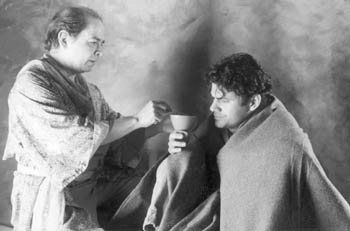![[Metroactive Stage]](/stage/gifs/stage468.gif)
[ Stage Index | San Jose | Metroactive Central | Archives ]
Jail Bonding
Two inmates form an unlikely friendship in 'The Kiss of the Spider Woman'
By Heather Zimmerman
FOOD AND ITS myriad implications had a starring role on Teatro Visión's stage this year: in its season opener, La Nona, food became the symbolic ruin of an upwardly aspiring middle-class family; La Posada Magica was more figurative in its themes of feeding a starved soul; and in Manuel Puig's Kiss of the Spider Woman, food is the catalyst for a friendship between two inmates jailed by an oppressive government in an unnamed Latin American country. Teatro Visión closes out its season with an impressive production of Puig's tender drama.
Director Kenneth Kelleher effectively strikes a sensitive balance of tension, light comedy and emotional drama between the characters. As the prisoners, Luis Oropeza and George Castillo work beautifully together, progressing convincingly from open antagonism to shaky friendship.
The gentle generosity of Molina (Oropeza), jailed for being gay, often rankles his cell mate, Valentine (Castillo), a Marxist revolutionary, who dismisses him as unmanly. Yet Valentine delights in Molina's reminiscences of movies he has seen, which he describes each night, like bedtime stories. Molina's favorite film concerns a beautiful woman who believes she is part panther--an obvious parable of the darkness within, which proves particularly appropriate as each man battles similar inner demons like feelings of unworthiness and loneliness.
The theme takes on added resonance when we learn that the warden has bargained with Molina for insider information from Valentine, whom prison officials have weakened with poisoned food. But Molina seems far more inclined to take advantage of the situation to care for the sick Valentine than to obtain his freedom. He takes particular joy in sharing and preparing food from the extravagant array of groceries supposedly brought by his mother but actually supplied by the prison as cover for Molina's trips to the warden.
Though we see he would never deem himself capable of acting politically, Molina's "espionage" turns into the ultimate subversive act as he uses the food supplied to him for spying to instead forge a relationship that heartens his and Valentine's spirits.
Oropeza and Castillo turn in excellent portrayals of Puig's complex and tormented characters, exploring their common ground and profound differences without lapsing into cliché. Oropeza exactly nails Molina's pain--we've understood his need to nurture Valentine as his desperate longing for acceptance long before he admits to it. Likewise, Castillo gets at the dark fear behind Valentine's stoic insistence that a revolutionary should never make lasting attachments to people.
Throughout the play, Puig evenly dishes out despair and hope, and this production maintains enough tension so that it's never obvious if either will win out. Leigh Henderson's set establishes the mood, narrowing the expansive stage to a small dark corner of a cell, framed by a large arch, whose perfect equilateral triangle shape recalls the pink triangle--a former symbol of oppression that has been reclaimed. In the budding of their unlikely friendship, Molina and Valentine claim a similar victory for themselves.
[ San Jose | Metroactive Central | Archives ]
Copyright © 2001 Metro Publishing Inc. Metroactive is affiliated with the Boulevards Network.
For more information about the San Jose/Silicon Valley area, visit sanjose.com.
![]()

Food for the Soul: Molina (Luis Oropeza) nurtures his cell mate, Valentine (Geroge Castillo), with food and friendship.
Kiss of the Spider Woman plays Thursday-Saturday at 8pm, Sunday at 2pm through April 1 at the Mexican Heritage Plaza, 1700 Alum Rock Road, San Jose. Tickets are $12-$17. (408.272.9926)
From the March 29-April 4, 2001 issue of Metro, Silicon Valley's Weekly Newspaper.